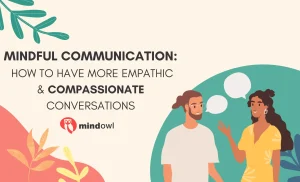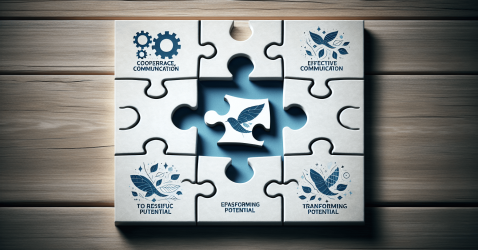Mindful Gratitude: Unlocking The Benefits Of Appreciation
Imagine a world where the simple act of gratitude has the power to transform your life. In this captivating article, we explore the concept of mindful gratitude and the incredible benefits it can bring. By embracing appreciation for the present moment and expressing gratitude towards ourselves and others, we unlock a treasure trove of positivity and happiness. So, prepare to embark on a journey of self-discovery as we delve into the transformative power of mindful gratitude.
The Importance of Mindful Gratitude
Why practicing gratitude is essential for overall well-being
Practicing gratitude is crucial for overall well-being because it helps shift your focus from what is lacking in your life to what is already abundant. When you develop a grateful mindset, you train your brain to notice and appreciate the positive aspects of your life, no matter how small they may seem. This shift in perspective allows you to cultivate a sense of contentment and satisfaction, leading to greater happiness and fulfillment.
Gratitude also has a profound impact on your mental health. By regularly acknowledging and expressing gratitude, you can reduce feelings of stress, anxiety, and depression. Research has shown that people who regularly practice gratitude have lower levels of negative emotions and higher levels of overall well-being.
The role of mindfulness in cultivating a grateful mindset
Mindfulness plays a crucial role in cultivating a grateful mindset because it helps you become more aware and present in the moment. When you practice mindfulness, you bring your attention to the present moment without judgment, allowing you to fully experience and appreciate the things around you.
By pairing gratitude with mindfulness, you can enhance your ability to notice and savor the positive aspects of your life. Mindfulness helps you become more attuned to the present moment, while gratitude allows you to acknowledge and appreciate the abundance in your life. Together, they provide a powerful combination for cultivating a grateful mindset and fostering overall well-being.
Understanding Mindfulness
Defining mindfulness and its origins
Mindfulness is the practice of intentionally paying attention to the present moment without judgment. It has its roots in ancient Eastern philosophies and meditation traditions, particularly within Buddhist teachings. The concept of mindfulness was brought to the West in the late 20th century, primarily through the work of Jon Kabat-Zinn, who developed the Mindfulness-Based Stress Reduction (MBSR) program.
The connection between mindfulness and mental health
Numerous studies have shown the positive impact that mindfulness can have on mental health. Regular practice of mindfulness has been found to reduce symptoms of anxiety and depression, improve focus and attention, and increase overall psychological well-being. Mindfulness has also been shown to increase emotional regulation, reducing reactivity to stressors and enhancing resilience.
By cultivating mindfulness, you can develop a greater sense of self-awareness, which can help you better understand your thoughts, emotions, and behaviors. This self-awareness allows you to respond to situations with greater intention and choice, rather than reacting automatically. Ultimately, mindfulness helps enhance mental health by promoting a greater sense of presence, acceptance, and compassion towards oneself and others.
Exploring the Power of Gratitude
The psychological benefits of gratitude
Practicing gratitude has numerous psychological benefits. It has been linked to increased happiness, life satisfaction, and overall well-being. When we express gratitude, our brain releases dopamine and serotonin, commonly known as the “feel-good” chemicals, which promote feelings of joy and contentment.
Gratitude also helps shift our focus from negative thoughts and emotions to positive ones. By consciously acknowledging and appreciating the positive aspects of our lives, we train our brains to seek out more positivity, leading to a more positive overall mindset. This effect can have a lasting impact on our mental health and emotional well-being.
How gratitude rewires the brain for positivity
Research has shown that regularly practicing gratitude can actually rewire our brains, leading to increased resilience and improved mental health. The act of expressing gratitude activates the brain’s reward center and stimulates the production of neurotransmitters associated with positive emotions.
Over time, this rewiring leads to increased neural pathways related to gratitude, making it easier for our brains to default to a positive mindset. The more we consciously practice gratitude, the stronger these neural pathways become, making it increasingly natural for us to notice and appreciate the positive aspects of our lives.
The impact of gratitude on relationships and social connections
Gratitude not only benefits individuals but also has a profound impact on relationships and social connections. Expressing gratitude towards others helps strengthen our relationships by fostering feelings of connection, appreciation, and love. It encourages a positive cycle of reciprocity, where both parties are motivated to continue expressing gratitude and acts of kindness.
Gratitude also enhances empathy and compassion, as it helps us recognize the kindness and support we receive from others. By acknowledging and appreciating the efforts of those around us, we cultivate a deeper sense of interconnectedness and foster stronger social bonds.
Applying Mindful Gratitude in Daily Life
Incorporating gratitude into a morning routine
Starting your day with mindful gratitude can set a positive tone for the rest of the day. Consider incorporating a gratitude practice into your morning routine by taking a few moments to reflect on three things you are grateful for. It could be as simple as the warmth of your bed, a good cup of coffee, or the support of a loved one.
By intentionally directing your attention towards gratitude at the beginning of the day, you prime your mind for positivity and create a foundation of appreciation to build upon throughout the day.
Practicing gratitude exercises and journaling
Gratitude exercises and journaling can help deepen your practice of mindful gratitude. You can set aside dedicated time each day to write down three to five things you are grateful for. This helps you become more aware of the positive aspects of your life and encourages a mindset of appreciation.
Additionally, you can engage in gratitude exercises such as writing a gratitude letter to someone you appreciate or keeping a gratitude jar where you write down moments of gratitude and collect them over time. These practices serve as visual reminders of the abundance in your life and can be a source of inspiration during challenging times.
Showing appreciation to others and expressing gratitude
Beyond personal practices, expressing gratitude and showing appreciation to others can have a profound impact on your relationships and overall well-being. Take the time to genuinely thank and acknowledge those who have made a positive impact on your life.
Whether it’s a heartfelt thank you note, a kind word, or a random act of kindness, these gestures of gratitude can have a ripple effect, spreading positivity and fostering deeper connections with those around you.
Mindful Gratitude and Stress Reduction
Using gratitude as a tool for stress management
In times of stress and adversity, practicing mindful gratitude can be a powerful tool for reducing stress and promoting resilience. By intentionally shifting your focus towards gratitude, you divert your attention from stressors and create space for positive emotions to arise.
In cultivating a grateful mindset, you train your brain to look for the silver linings and positives in challenging situations. This shift in perspective can help diminish the impact of stress and improve your ability to cope with difficult circumstances.
The effects of gratitude on anxiety and depression
Gratitude has been shown to have a positive impact on both anxiety and depression. When we practice gratitude, we activate the dopamine and serotonin systems in our brains, promoting feelings of happiness and contentment.
Gratitude also helps challenge negative thought patterns commonly associated with anxiety and depression. By intentionally focusing on what we are grateful for, we interrupt the cycle of negative rumination and shift our attention towards positive aspects of our lives.
Ways to integrate gratitude into mindfulness-based stress reduction techniques
Mindfulness-based stress reduction techniques can be enhanced by the incorporation of gratitude practices. During mindfulness meditation, take a few moments to direct your attention towards gratitude. Reflect on the things you are grateful for, such as your breath, body, or the present moment.
You can also incorporate gratitude into body scan meditations by expressing gratitude for each part of your body as you bring your awareness to it. By combining mindfulness and gratitude, you deepen your practice and create a greater sense of well-being.
Cultivating Mindful Gratitude through Meditation
How meditation enhances gratitude
Meditation is a powerful tool for cultivating mindful gratitude as it helps quiet the mind and cultivate a state of presence and awareness. By engaging in regular meditation practice, you create a space for gratitude to arise naturally.
As you sit in meditation, notice any sensations, thoughts, or emotions that arise. Cultivate a sense of gratitude for this present moment, recognizing the gift of awareness and the opportunity for inner growth and reflection. Meditation enhances gratitude by allowing you to deeply connect with the present moment and cultivate a sense of contentment, regardless of external circumstances.
Specific meditation techniques for cultivating gratitude
Several meditation techniques can specifically cultivate gratitude. Loving-kindness meditation, also known as metta meditation, involves directing well-wishes towards yourself and others. By generating feelings of love, compassion, and gratitude, you can enhance your ability to cultivate a grateful mindset.
Another technique is the “Three Good Things” meditation, where you reflect on three positive things that happened during your day and express gratitude for them. This practice helps rewire your brain to focus on the positive and encourages a mindset of appreciation.
Guided gratitude meditations and apps
Guided gratitude meditations and mindfulness apps can be valuable resources for cultivating mindful gratitude. These tools provide step-by-step guidance and support, making it easier to integrate gratitude into your meditation practice.
There are various apps available that offer guided gratitude meditations, such as Headspace and Calm. These meditations provide a structure and framework for cultivating gratitude, allowing you to deepen your practice and experience the benefits of mindful gratitude.
Mindful Gratitude in the Workplace
The positive impact of gratitude on workplace culture
Gratitude has a profound impact on workplace culture, fostering a positive and supportive environment. When leaders and employees express gratitude for each other’s contributions and achievements, it creates a sense of appreciation and motivation. This, in turn, improves morale, job satisfaction, and overall productivity.
A workplace culture that values and encourages gratitude fosters a sense of belonging and cohesion, creating a supportive community where individuals feel valued and appreciated.
Appreciation and recognition practices for enhancing employee well-being
Implementing appreciation and recognition practices in the workplace is essential for enhancing employee well-being. Simple gestures such as expressing gratitude during team meetings, recognizing individual achievements, or providing opportunities for employees to share their gratitude for each other can make a significant difference.
Companies can also establish formal recognition programs, where employees are rewarded and acknowledged for their contributions. By making gratitude a core value in the workplace, organizations can cultivate a positive work environment that promotes employee well-being and engagement.
Creating a gratitude-focused work environment
Creating a gratitude-focused work environment involves fostering a culture of appreciation and recognition. This can be achieved by implementing regular gratitude rituals, such as having a gratitude wall or board where employees can express their appreciation for their colleagues.
Leaders should also lead by example and cultivate a personal practice of gratitude, expressing appreciation for their team members’ efforts and contributions. By actively promoting a gratitude-focused work environment, organizations can enhance employee satisfaction and create a positive and thriving workplace culture.
Nurturing Long-term Gratitude Practices
Overcoming challenges and maintaining consistency in gratitude practice
Like any habit, cultivating a long-term gratitude practice can sometimes be challenging. To overcome obstacles, it’s important to find strategies that work for you and help maintain consistency.
One approach is to incorporate gratitude into existing routines. For example, you can incorporate gratitude journaling into your bedtime routine or practice mindful gratitude during your daily commute. By integrating gratitude into your regular activities, it becomes easier to make it a consistent part of your life.
Methods for cultivating gratitude as a habit
To cultivate gratitude as a habit, consistency is key. Set aside dedicated time each day to engage in gratitude practices, such as journaling or expressing appreciation to others. Consistency helps reinforce the neural pathways associated with gratitude, making it more natural and automatic over time.
Another method is to create visual reminders of gratitude. Place sticky notes with gratitude reminders in places you frequent, such as your workspace or mirror. These gentle prompts serve as cues to pause and reflect on what you are grateful for.
The importance of perseverance and patience in mindful gratitude
Cultivating mindful gratitude requires perseverance and patience. It is a practice that takes time to develop and deepen. There may be days when it feels challenging or when you struggle to find things to be grateful for. During these moments, it’s crucial to be patient with yourself and remember that gratitude is a skill that can be cultivated with practice.
By continuing to engage in mindful gratitude, even during difficult times, you build resilience and strengthen the neural pathways associated with gratitude. Over time, gratitude becomes more natural, and the benefits become more apparent in your life.
Mindful Gratitude and Physical Health
The link between gratitude and physical health
Gratitude has been linked to various physical health benefits. Research suggests that practicing gratitude can improve immune function, lower blood pressure, and reduce inflammation in the body. Regularly expressing gratitude is also associated with lower levels of stress hormones, which can have a positive impact on physical health.
Furthermore, gratitude promotes healthier lifestyle choices, such as regular exercise, a balanced diet, and adequate sleep. By cultivating a grateful mindset, you become more aware of the importance of taking care of your physical well-being, leading to improved overall health.
How gratitude improves sleep quality and contributes to overall vitality
Quality sleep is crucial for overall vitality and well-being. Gratitude has been shown to improve sleep quality by reducing anxiety and inducing feelings of relaxation and contentment. When you cultivate a grateful mindset, you are more likely to focus on the positive aspects of your day, creating a sense of peace and tranquility that can enhance sleep.
Adequate sleep not only improves physical health but also contributes to mental and emotional well-being. By practicing gratitude and promoting quality sleep, you can enhance your overall vitality and enjoy a higher quality of life.
Gratitude as a natural antidepressant
Gratitude has a natural antidepressant effect on the brain. When we express gratitude, our brains release dopamine and serotonin, neurotransmitters associated with feelings of happiness and well-being. This release of “feel-good” chemicals can alleviate symptoms of depression and enhance mood.
By practicing mindful gratitude, you can complement traditional approaches to addressing depression and promote a more positive outlook on life. It serves as a powerful tool for boosting mental health and emotional well-being.
Mindful Gratitude in Challenging Times
Harnessing gratitude during difficult circumstances
During challenging times, cultivating mindful gratitude can provide solace, hope, and a sense of perspective. It helps shift your focus from what is lacking to what is present, fostering a mindset of abundance and resilience.
By consciously finding moments of gratitude amidst adversity, you empower yourself to navigate through difficult circumstances with greater strength and grace. Gratitude serves as a reminder that there is always something to be grateful for, even when life is challenging.
Using gratitude to find meaning and purpose in adversity
Adversity often presents opportunities for growth and transformation. By practicing mindful gratitude, you can find meaning and purpose in challenging situations. Reflect on the lessons learned, the strength you have developed, and the growth that has taken place as a result of the adversity.
Gratitude helps shift your perspective from victimhood to empowerment, allowing you to embrace the challenges as opportunities for personal development and transformation.
How gratitude helps build resilience
Gratitude plays a crucial role in building resilience. By cultivating a grateful mindset, you train your brain to focus on the positive aspects of your life, even in the face of adversity. This positive outlook enhances your ability to bounce back from setbacks and overcome challenges with greater optimism and resilience.
Practicing mindful gratitude allows you to reframe difficult circumstances, find silver linings, and tap into your inner strength. It serves as a powerful tool for building resilience and navigating through life’s ups and downs with grace and gratitude.
In conclusion, practicing mindful gratitude is essential for overall well-being as it helps shift your mindset towards appreciation and abundance. Through mindfulness and gratitude, you can rewire your brain for positivity, enhance your mental health, and foster stronger relationships and social connections. By incorporating gratitude into your daily life, practicing meditation techniques, and promoting gratitude in the workplace, you can nurture a grateful mindset that positively impacts your physical health and helps you navigate challenging times with resilience and gratitude.
















